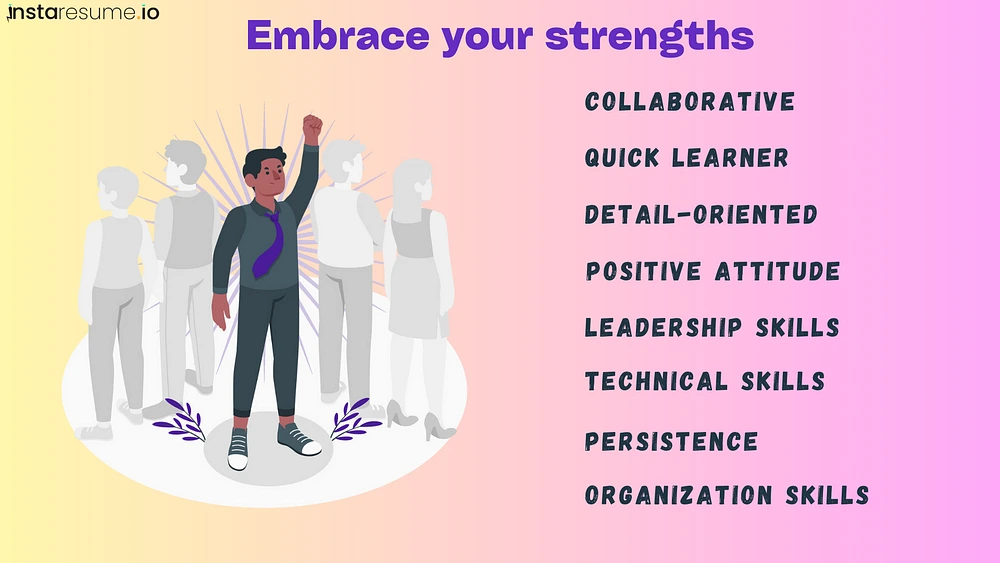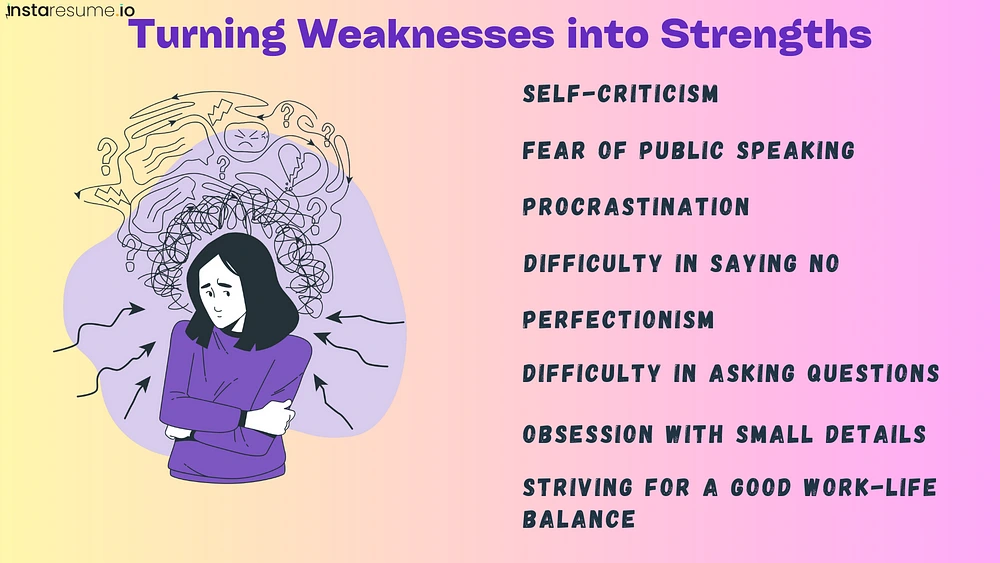What are your Strengths and Weaknesses?

Photo by Victor Freitas on Unsplash
Introduction
Job interviews serve as the pivotal gateway to your career aspirations. They offer a unique opportunity for prospective employers to assess your qualifications, but they also present a platform for you to showcase your strengths and acknowledge your areas of improvement. One common and often challenging question that frequently arises in interviews is, “What are your strengths and weaknesses?”
While discussing your strengths can be a moment to shine, addressing your weaknesses requires finesse and self-awareness. It's essential to remember that employers aren't seeking perfect candidates; they're looking for individuals with a blend of skills, experiences, and a commitment to personal growth.
In this blog post, we will guide you on how to confidently navigate the terrain of strengths and weaknesses in job interviews. We'll explore the art of answering strengths and weaknesses interview question with strengths — attributes such as collaboration, quick learning, attention to detail, a positive attitude, problem-solving prowess, leadership skills, effective communication, technical proficiency, persistence, and organizational prowess. Simultaneously, we'll delve into candid discussions of potential weaknesses, such as self-criticism, public speaking anxiety, procrastination, perfectionism, lack of specific skills, confidence issues, reluctance to ask questions, fixation on minutiae, difficulty saying no, and the pursuit of a balanced work-life harmony.
Tell me about your strengths?
When addressing your strengths in a job interview, it's not enough to simply list them. You need to demonstrate how these strengths have positively impacted your work and how they align with the job requirements. Here's how to effectively tell about your strengths with examples:

Photo by Victor Freitas on Unsplash
Collaborative
Describe how you enjoy working with diverse teams. For instance, share an example of when you led a project involving various stakeholders and teams. Explain how your collaborative approach led to effective teamwork, resulting in the project's successful completion ahead of schedule.
Quick Learner
Highlight your ability to adapt to new information and technologies. Share a story from your past where you quickly acquired a new skill, such as learning a new programming language or mastering complex software, and how this skill was crucial in a project's success.
Detail-Oriented
Stress your attention to detail by discussing a specific instance where your meticulous approach prevented errors or improved the quality of a project. Mention how you routinely proofread and ensure the accuracy of documents before submission.
Positive Attitude
Provide an example of how your optimistic outlook helped you navigate challenging situations. Discuss a project where you encountered unexpected obstacles but maintained a positive attitude, inspiring your team to find innovative solutions.
Leadership Skills
Narrate a story about a time when you led a team, delegated tasks effectively, and motivated team members to accomplish their goals. Mention how your leadership resulted in the team's success and your own promotion.
Technical Skills
Talk about your proficiency in specific technical areas, such as programming languages or software. Describe how your technical expertise directly contributed to the success of a project, highlighting your hands-on experience.
Persistence
Mention how your persistence and commitment to detail-oriented work have consistently helped you achieve your goals. Share a specific project where your determination played a crucial role in meeting deadlines without compromising quality.
Organization Skills
Provide an example of a project that was at risk of being delayed, but you used your organizational skills to efficiently allocate resources and ensure its timely completion.
Tell me about your Weaknesses?
Acknowledging your weaknesses in a job interview can be a challenging but crucial part of presenting yourself as an all-rounder candidate. When addressing weaknesses, it's essential to demonstrate self-awareness and a commitment to self-improvement. Here's how to address your weaknesses effectively, along with practical examples:

Turning your weakness into strength
Self-Criticism
Mention your tendency to be overly critical of yourself. For example, share a situation where you realized your self-criticism was affecting your motivation. Explain how you've started celebrating your achievements, no matter how small, to maintain a positive mindset.
Fear of Public Speaking
Admit your nervousness when speaking publicly. Recall a specific instance when you had to present a project to a board, and your fear of public speaking hindered your performance. Discuss how you've taken steps, such as enrolling in a public speaking course, to overcome this fear.
Procrastination
Explain your habit of delaying tasks. Offer a practical example of a time when procrastination led to missed deadlines. Describe your new approach, like using a calendar and daily to-do lists to stay organized and motivated.
Perfectionism
Share how your pursuit of perfectionism sometimes hampers your ability to meet deadlines. Provide a project scenario where your perfectionist tendencies led to overwork and delays. Discuss how you've learned to seek feedback and trust your colleagues to maintain high quality without unnecessary delays.
Difficulty in Asking Questions
Talk about your hesitation in asking questions when unsure. Share an instance when not asking questions led to misunderstandings or miscommunications. Explain how you now make an effort to seek clarification when needed, which has improved your efficiency and communication.
Obsession with Small Details
Mention your inclination to overanalyze and redo work. Provide a specific project where your obsession with small details caused delays. Discuss how you've started sharing your work with colleagues and seniors to ensure you maintain quality while meeting deadlines.
Difficulty in Saying No
Admit your struggle to decline requests. Share a situation where your inability to say no led to overcommitment and burnout. Explain how you're learning to manage your workload and prioritize tasks effectively.
Striving for a Good Work-Life Balance
Discuss your tendency to prioritize work over personal life. Share a time when this imbalance affected your personal life negatively. Describe your efforts to create a timetable that allows you to leave the office early on specific days and prioritize your well-being.
Strengths and Weaknesses Interview examples:
Communication Skills
“One of my key strengths is my effective communication skills. I've honed this ability through years of experience and education. In my previous role, I was responsible for coordinating a cross-functional team on a complex project. By actively listening to team members, I was able to ensure clear communication and create a positive work environment. This helped us complete the project ahead of schedule and with fewer errors.”
Leadership Skills
“My leadership skills are a significant asset. For instance, in my previous role, I led a team of ten individuals, including several junior team members. I focused on guiding and motivating them through their initial tasks and ensured a balanced workload distribution. As a result, our team consistently exceeded our key performance indicators every quarter, and I was promoted for my leadership and team management.”
Problem-Solving
“I excel in problem-solving. As an electrical engineer, I encountered numerous technical challenges in my previous role. When a problem arose, I conducted thorough research and was not afraid to seek input and advice from my colleagues. This approach led to innovative solutions and contributed to my extensive professional growth.”
Collaboration
“Collaboration is one of my greatest strengths. In a recent project, I led a team composed of members from various departments. I saw this as an opportunity to engage with diverse perspectives. Our effective collaboration led to the project's early completion, showcasing my ability to work seamlessly with a team to achieve common goals.”
Perfectionism
“One weakness I've identified is my inclination towards perfectionism. It has, at times, resulted in over-analysis and missed deadlines. However, I've learned to strike a balance. For instance, on a recent project, I sought regular feedback from my team, which helped me maintain high standards while meeting project deadlines effectively.”
Lacking Confidence
“I've struggled with a lack of confidence in sharing my thoughts and opinions. In some instances, it prevented me from contributing effectively. I recognized this and have started actively engaging with colleagues and expressing my ideas. This has helped me gain confidence and become a more valuable team member.”
Fear of Public Speaking
“Public speaking has been a weakness I've been working on. During a presentation to senior management, I felt nervous, impacting my performance. To address this, I enrolled in public speaking courses and am gradually gaining confidence. I recognize that clear communication is vital in my field, and I'm committed to improving this skill.”
Difficulty in Asking Questions
“I've sometimes found it challenging to ask questions, especially in group settings. This has led to misunderstandings and miscommunications. To overcome this, I've made a conscious effort to seek clarification one-on-one when needed. This approach has not only improved my efficiency but also enhanced my working relationships.”
Conclusion
In job interviews, mastering your strengths and conquering your weaknesses is essential. Embrace authenticity by openly discussing your strong points and discussing areas that need improvement. Use real-life stories to illustrate your capabilities, engaging your interviewers. Demonstrating a growth mindset reveals how you're addressing weaknesses to grow professionally. Tailor your responses to the job's requirements, and practice your answers for confidence. Interviews aren't just about qualifications but also about potential. With these insights, you're well-equipped to shine in interviews and secure positions that align with your strengths and support your development. Best of luck in your job interview journey!

